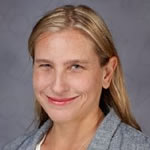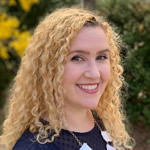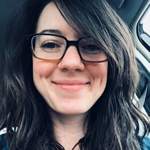 Anne Cooper Moore, Dean, J. Murrey Atkins Library, holds an MS in Library and Information Science and PhD in Educational Management and Development. She enthusiastically strives to shape library facilities, collections, and services that meet the continuously evolving needs of a diverse and inclusive public university community. Her research interests include assessment of library activities, library facilities, and information literacy. She has designed study, collaboration, academic support, and classroom spaces in four different academic libraries. She has taught undergraduate and graduate courses in college skills and writing, information literacy, management, and research methods at five different universities. She has been continuously active in RUSA, ACRL, and LLAMA and is currently President of LLAMA. She is also chair of the UNC System University Library Advisory Council.
Anne Cooper Moore, Dean, J. Murrey Atkins Library, holds an MS in Library and Information Science and PhD in Educational Management and Development. She enthusiastically strives to shape library facilities, collections, and services that meet the continuously evolving needs of a diverse and inclusive public university community. Her research interests include assessment of library activities, library facilities, and information literacy. She has designed study, collaboration, academic support, and classroom spaces in four different academic libraries. She has taught undergraduate and graduate courses in college skills and writing, information literacy, management, and research methods at five different universities. She has been continuously active in RUSA, ACRL, and LLAMA and is currently President of LLAMA. She is also chair of the UNC System University Library Advisory Council.
 Dr. Rebecca (Becky) Croxton is the Head of Assessment for J. Murrey Atkins Library at the University of North Carolina at Charlotte. She earned a PhD in educational studies, a doctoral minor in educational research methods, and her MLIS degree from the University of North Carolina at Greensboro (UNCG). Becky is also an adjunct lecturer for the UNCG MLIS program and has taught a variety of courses including Data Visualization and Media Production Services. She previously worked as a Reference Librarian at both Johnson & Wales University’s Charlotte campus and Central Piedmont Community College. She is an active researcher and has published numerous articles and presented nationally on a variety of topics including quantifying the value of the academic library, online learning, professional identity development, and information seeking needs, preferences, and motivation of undergraduate students. She is a member of Association of College & Research Library’s Value of Academic Libraries Committee and is actively involved in the Library Leadership & Management Association (LLAMA) Assessment Community of Practice.
Dr. Rebecca (Becky) Croxton is the Head of Assessment for J. Murrey Atkins Library at the University of North Carolina at Charlotte. She earned a PhD in educational studies, a doctoral minor in educational research methods, and her MLIS degree from the University of North Carolina at Greensboro (UNCG). Becky is also an adjunct lecturer for the UNCG MLIS program and has taught a variety of courses including Data Visualization and Media Production Services. She previously worked as a Reference Librarian at both Johnson & Wales University’s Charlotte campus and Central Piedmont Community College. She is an active researcher and has published numerous articles and presented nationally on a variety of topics including quantifying the value of the academic library, online learning, professional identity development, and information seeking needs, preferences, and motivation of undergraduate students. She is a member of Association of College & Research Library’s Value of Academic Libraries Committee and is actively involved in the Library Leadership & Management Association (LLAMA) Assessment Community of Practice.
Increasing accessibility is a major goal in all of the plans. In support of the library’s strategic goals to improve accessibility, several efforts have been underway, including:
1) Establishing a library Accessibility Committee,
2) Collaborating with the university’s Office of Disability Services to survey students to identify physical access barriers in the library (to be addressed in 2020),
3) Maintaining representation on the campus disability services/accessibility committee, which monitors physical and online accessibility best practices (these connections are helping the library address major accessibility issues to an early-1960’s building), and
4) Completely redesigning the library’s website with a user-centric, task-oriented approach after a year of usability testing.
Simultaneously, the ULAC Accessibility Committee assessed and developed best practices for the 17 system library accessibility web pages. In Summer 2020, the chair of the library’s Accessibility Committee will supervise a library school fellow to review the system library web pages and provide feedback to each library. The fellow will also draft an accessibility plan for the library.
The outcomes of the accessibility initiatives demonstrate a culture of assessment in an individual library, a university, and a system to the direct benefit of students. Connections with the Academic Affairs accessibility team, Disability Services, and Facilities are helping improve library accessibility. At the ULAC/System level, accessibility initiatives have provided consistent information on how to access system libraries for all populations.
Planning and intentionality are key to the success of the accessibility projects at multiple levels. Engaging a library-wide Strategic Planning Committee to identify the goals, objectives, expected performance outcomes, and tasks and tracking/adjusting them throughout the year helps keep the library moving steadily forward. Linking planning and assessment reinforces the importance of assessment in everything we do. Presenting reports from assessment projects to library staff, campus committees, and system leaders creates understanding of the importance of the assessment cycle, closing the loop, and library improvement. The library, campus, and system clearly understand the power of the assessment cycle to continuously improve efficiency and student success.
 Melissa Fraser-Arnott is the Chief of Integrated Reference Services at the Library of Parliament in Ottawa, Canada where she manages a team of embedded subject-specialist research librarians. She has 15 years experience in special libraries and government settings including the Office of the Privacy Commissioner of Canada, the Canadian Department of Foreign Affairs and International Trade, the Centre for International Governance Innovation, and the Canadian Police College. She has a doctorate from Queensland University of Technology through the San José Gateway PhD Program, an MLIS from the University of Western Ontario, and will complete an MBA from the Australian Institute of Business in 2020. She is an active member of SLA, ALA, and ALISE. Her research interests include professional identities, LIS competencies, professional development, and library management.
Melissa Fraser-Arnott is the Chief of Integrated Reference Services at the Library of Parliament in Ottawa, Canada where she manages a team of embedded subject-specialist research librarians. She has 15 years experience in special libraries and government settings including the Office of the Privacy Commissioner of Canada, the Canadian Department of Foreign Affairs and International Trade, the Centre for International Governance Innovation, and the Canadian Police College. She has a doctorate from Queensland University of Technology through the San José Gateway PhD Program, an MLIS from the University of Western Ontario, and will complete an MBA from the Australian Institute of Business in 2020. She is an active member of SLA, ALA, and ALISE. Her research interests include professional identities, LIS competencies, professional development, and library management.
 Maureen Martyn, MLIS (McGill University, 1988), has more than twenty years’ experience working in the Canadian parliamentary milieu. From her early days as a reference librarian to her current role as chief of Branches and Reference Services, Maureen has been involved in many parliamentary projects, including LegisInfo and HillNotes, the Library’s research publications blog. She has held several management positions, including managing multidisciplinary teams at both the Library of Parliament and the House of Commons. She currently manages a team of more than twenty research librarians, senior research librarians and branch managers.
Maureen Martyn, MLIS (McGill University, 1988), has more than twenty years’ experience working in the Canadian parliamentary milieu. From her early days as a reference librarian to her current role as chief of Branches and Reference Services, Maureen has been involved in many parliamentary projects, including LegisInfo and HillNotes, the Library’s research publications blog. She has held several management positions, including managing multidisciplinary teams at both the Library of Parliament and the House of Commons. She currently manages a team of more than twenty research librarians, senior research librarians and branch managers.

 Jill Dawson is the Electronic Resources Librarian at the University of North Texas. Previously, she worked for over a decade in public libraries.
Jill Dawson is the Electronic Resources Librarian at the University of North Texas. Previously, she worked for over a decade in public libraries. Sian Brannon (she, her, hers), the Associate Dean for Collection Management at University of North Texas Libraries, has been in libraries since the 1990s. She has worked in public, academic, and technical libraries, but likes her home library the best. Her research interests include supervision/leadership, internships, assessment, Fear of Negative Evaluation, and randomly, the Technology Acceptance Model. She edits Public Services Quarterly, and is an adjunct professor for Technical Services/Research Methods courses.
Sian Brannon (she, her, hers), the Associate Dean for Collection Management at University of North Texas Libraries, has been in libraries since the 1990s. She has worked in public, academic, and technical libraries, but likes her home library the best. Her research interests include supervision/leadership, internships, assessment, Fear of Negative Evaluation, and randomly, the Technology Acceptance Model. She edits Public Services Quarterly, and is an adjunct professor for Technical Services/Research Methods courses.
 Cory Lampert is the Head of Digital Collections and a Professor at the University of Nevada, Las Vegas. Cory is responsible for leading a robust team responsible for digitization activities, metadata and linked data creation, and digital asset management. Her research interests include linked data, digital library competencies, and strategic planning for digital libraries. She is also active in several service activities focused on libraries and data, mentoring new librarians, and labor issues for contingent digital workers.
Cory Lampert is the Head of Digital Collections and a Professor at the University of Nevada, Las Vegas. Cory is responsible for leading a robust team responsible for digitization activities, metadata and linked data creation, and digital asset management. Her research interests include linked data, digital library competencies, and strategic planning for digital libraries. She is also active in several service activities focused on libraries and data, mentoring new librarians, and labor issues for contingent digital workers.
 Darnelle Melvin is the Special Collections and Archives Metadata Librarian and an Assistant Professor at the University of Nevada, Las Vegas, where he is responsible for managing metadata activities, remediation projects, and metadata documentation. He is co-author of
Darnelle Melvin is the Special Collections and Archives Metadata Librarian and an Assistant Professor at the University of Nevada, Las Vegas, where he is responsible for managing metadata activities, remediation projects, and metadata documentation. He is co-author of  Seth Shaw is an Application Developer for the University of Nevada, Las Vegas, Libraries dedicated to Special Collections and Archives. Previously, he was the Electronic Records Archivist for Duke University and an Assistant Professor of Archival Studies at Clayton State University. He has been developing IT solutions for special collections and archives, off and on, since his days as an undergraduate student.
Seth Shaw is an Application Developer for the University of Nevada, Las Vegas, Libraries dedicated to Special Collections and Archives. Previously, he was the Electronic Records Archivist for Duke University and an Assistant Professor of Archival Studies at Clayton State University. He has been developing IT solutions for special collections and archives, off and on, since his days as an undergraduate student. Dr. Catherine Sassen (she, her, hers) is Principal Catalog Librarian at the University of North Texas. She has published and presented on cataloging, indexing, assessment, career development, and mentoring.
Dr. Catherine Sassen (she, her, hers) is Principal Catalog Librarian at the University of North Texas. She has published and presented on cataloging, indexing, assessment, career development, and mentoring. Nicole Potdevin, (M.A., M.L.I.S.) is the Associate University Librarian and Director of Public Services at Fairleigh Dickinson University’s Florham Campus Library in Madison, NJ. She earned a M.A. in Art History and Archaeology from the Institute of Fine Arts – New York University in 2009, and a M.L.I.S. from Rutgers University in 2014. Nicole’s main areas of interest and research are information literacy, professional development, and assessment in academic libraries.
Nicole Potdevin, (M.A., M.L.I.S.) is the Associate University Librarian and Director of Public Services at Fairleigh Dickinson University’s Florham Campus Library in Madison, NJ. She earned a M.A. in Art History and Archaeology from the Institute of Fine Arts – New York University in 2009, and a M.L.I.S. from Rutgers University in 2014. Nicole’s main areas of interest and research are information literacy, professional development, and assessment in academic libraries. Julia McKenna has been working in libraries for the past 5 years, most recently as the Circulation Services Manager at Jacksonville University. Her experience includes time in almost every part of library operations including circulation, technical services, periodicals, government documents, and ILL. She holds a bachelor’s degree from Jacksonville University and is a current MLIS student at Valdosta State University and MSOL student a Jacksonville University. Julia is a member of the ALA TOLD committee and a current participant in the Sunshine State Library Leadership Institute. She is also the founder of Managerine LLC, an educational platform for new and aspiring female leaders. Her article “So many students, so little time: Practical student worker training in an academic library” was published in the January edition of the Journal of Access Services.
Julia McKenna has been working in libraries for the past 5 years, most recently as the Circulation Services Manager at Jacksonville University. Her experience includes time in almost every part of library operations including circulation, technical services, periodicals, government documents, and ILL. She holds a bachelor’s degree from Jacksonville University and is a current MLIS student at Valdosta State University and MSOL student a Jacksonville University. Julia is a member of the ALA TOLD committee and a current participant in the Sunshine State Library Leadership Institute. She is also the founder of Managerine LLC, an educational platform for new and aspiring female leaders. Her article “So many students, so little time: Practical student worker training in an academic library” was published in the January edition of the Journal of Access Services.  Brittany Richardson is the Web Services Librarian at the University of Tennessee at Chattanooga Library. Her primary work includes front-end web development and content coordination. She conducts assessment of web content through UX testing, stakeholder feedback, and analytics. She strives to continuously improve user experience through collaborative efforts with colleagues across the library.
Brittany Richardson is the Web Services Librarian at the University of Tennessee at Chattanooga Library. Her primary work includes front-end web development and content coordination. She conducts assessment of web content through UX testing, stakeholder feedback, and analytics. She strives to continuously improve user experience through collaborative efforts with colleagues across the library. Rhonda Marker is Director, Shared User Services at Rutgers University Libraries. Among her responsibilities are the coordination of support and infrastructure for online information literacy and library instruction, as well as the management of digital projects and library publishing. Previous positions included Repository Collection Manager and Head of Cataloging. Rhonda has been active in ALA for more than 30 years, serving on several ALCTS committees. In that time, she was involved in the review of groups and committees that resulted in substantive changes and even the dissolution of groups that were no longer necessary. No librarians were harmed in the committee restructuring. Recently, Rhonda observed the stresses on sustaining committees and member involvement when they began meeting more often online than in person at ALA conferences.
Rhonda Marker is Director, Shared User Services at Rutgers University Libraries. Among her responsibilities are the coordination of support and infrastructure for online information literacy and library instruction, as well as the management of digital projects and library publishing. Previous positions included Repository Collection Manager and Head of Cataloging. Rhonda has been active in ALA for more than 30 years, serving on several ALCTS committees. In that time, she was involved in the review of groups and committees that resulted in substantive changes and even the dissolution of groups that were no longer necessary. No librarians were harmed in the committee restructuring. Recently, Rhonda observed the stresses on sustaining committees and member involvement when they began meeting more often online than in person at ALA conferences.